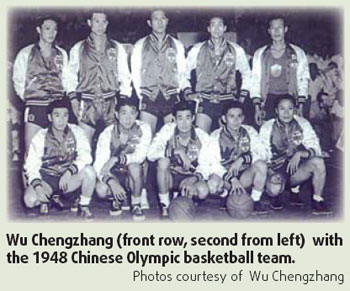Wu Chengzhang has been quietly glued to his television set, watching Olympic basketball games from his apartment in metropolitan Shanghai.
The 84-year-old is not alone in his fascination with the sport, as the 2008 Beijing Olympics have had all eyes focused on basketball superstar Yao Ming.
And even though the 1.76m-tall elderly man never enjoyed the same fame as Yao today, he is no less significant to Chinese Olympic basketball than the 2.26m-tall Houston Rockets center.

Wu Chengzhang is one of the two living Chinese athletes who competed at the London Olympics in 1948. [China Daily]
|
Wu is one of two living Chinese athletes who competed at the 14th Olympic Games in London in 1948. The other one is his teammate, 92-year-old Li Zhenzhong, who also lives in Shanghai.
Back then Wu never dreamt China would one day host the Olympic Games.
"I am very, very excited that China is holding the Olympic Games," he says with a resonant voice that sounds much younger than his age.
The Olympics that Wu attended 60 years ago were a far cry from today's Games. For him, they were not only filled with honor, but also regret and humiliation.
China sent 33 athletes to the 1948 London Games to compete in basketball, soccer, track and field, swimming and biking. It was three years after the country emerged from World War II. The Kuomintang (KMT) government in power at the time was teetering, to funding for the Chinese Olympic delegation was limited. The basketball and soccer teams had to raise money by playing games in Shanghai, Hong Kong and Southeast Asia.

"I was so glad to represent my country to attend the Games," Wu recalls. "(But) the government at that time didn't show the kind of support that the government today provides."
Few greeted the Chinese athletes at London's airport. Their flag-raising ceremony was also unimpressive, in sharp contrast to the ones of many other countries, Wu recalls. Unable to afford the high fee, the Chinese delegation stayed at the Olympic village for only two days before it had to move to a vocational school in the suburbs of London, eating rice, vegetables and pickles that were shipped from China to cut costs. Four tons of food was reportedly shipped to London, as everything in the British capital, which was still recovering from the war, was far too expensive for the Chinese athletes.